|
|
|
Sort Order |
|
|
|
Items / Page
|
|
|
|
|
|
|
| Srl | Item |
| 1 |
ID:
163453
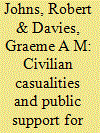

|
|
|
|
|
| Summary/Abstract |
In contrast to the expansive literature on military casualties and support for war, we know very little about public reactions to foreign civilian casualties. This article, based on representative sample surveys in the United States and Britain, reports four survey experiments weaving information about civilian casualties into vignettes about Western military action. These produce consistent evidence of civilian casualty aversion: where death tolls were higher, support for force was invariably and significantly lower. Casualty effects were moderate in size but robust across our two cases and across different scenarios. They were also strikingly resistant to moderation by other factors manipulated in the experiments, such as the framing of casualties or their religious affiliation. The importance of numbers over even strongly humanizing frames points toward a utilitarian rather than a social psychological model of casualty aversion. Either way, civilian casualties deserve a more prominent place in the literature on public support for war.
|
|
|
|
|
|
|
|
|
|
|
|
|
|
|
|
| 2 |
ID:
163440
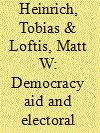

|
|
|
|
|
| Summary/Abstract |
Although foreign policies often fail to successfully promote democracy, over a decade of empirical research indicates that foreign aid specifically for democracy promotion is remarkably successful at improving the survival and institutional strength of fragile democracies. However, these measures cannot tell us how well democracy aid supports the central promise of democracy: accountable government. Since institutions can be subverted in various ways that undermine accountability, it is vital to know whether democracy aid supports accountability to assess its overall success. We provide evidence for this by analyzing incumbent turnover in elections, following poor economic performance—the economic vote—as a measure of voting to achieve performance accountability. In our analysis of over 1,100 elections in 114 developing countries between 1975 and 2010, we find distinct evidence that increasing receipt of democracy aid is associated with more economic voting. Results are robust to numerous alternative empirical specifications.
|
|
|
|
|
|
|
|
|
|
|
|
|
|
|
|
| 3 |
ID:
163445
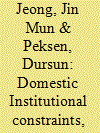

|
|
|
|
|
| Summary/Abstract |
What effect do the domestic institutional constraints in target states have on sanction outcomes? Other than the narrow focus on political regime type, little is known about how the institutional makeup of target states might affect leaders’ ability to adjust their policies to defy sanctions. We assert that the size of veto players in targets is a crucial yet overlooked institutional factor in explaining sanction effectiveness. We contend that political leaders subject to the approval of multiple veto players are more likely to concede as they are less likely to develop polices to counter the sanctions. We assess the empirical merits of our theoretical claims by combining data on sanctions from the Threat and Imposition of Economic Sanctions data set with the veto points data from the Political Constraints data set. Results from the data analysis for the 1946 to 2005 period indicate that the size of veto players is a significant predictor of sanction success even when we control for political regime type and other major political and economic covariates of sanction effectiveness.
|
|
|
|
|
|
|
|
|
|
|
|
|
|
|
|
| 4 |
ID:
163431
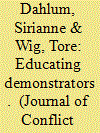

|
|
|
|
|
| Summary/Abstract |
Does a more educated population spur regime-challenging mass protest? It is commonly argued that educated individuals are more likely to collectively challenge governments through protests and that this may explain why education is associated with democratization. While many studies have investigated education’s effect on conventional political participation (voting, petitioning, etc.), it is not known whether education levels affect contentious mass protest. This article argues that education increases the frequency of mass protest, by alleviating collective-action problems and motivating mass opposition, particularly in autocracies. These links are investigated at the subnational level in Africa, by mapping over 600,000 survey respondents to spatialized protest-event data. We present evidence that areas with more educated populations have higher levels of protest activity, and we find mixed evidence consistent with both opportunity- and grievance-related mechanisms driving this relationship. We proceed to identify the causal effect of education by using the location of colonial-era Christian missions to instrument for local education levels.
|
|
|
|
|
|
|
|
|
|
|
|
|
|
|
|
| 5 |
ID:
163433
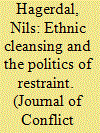

|
|
|
|
|
| Summary/Abstract |
What happens when an armed group has military incentives to engage in ethnic cleansing, but political incentives to abstain? I argue that militants can solve this dilemma by collecting intelligence that allows them to discriminate between neutral and militant non-coethnics and target only the latter. Armed groups are better able to do so in intermixed areas, where loyal coethnics provide intelligence, and thus more likely to perpetrate selective violence in such locations. Homogenous, non-coethnic enclaves are more susceptible to ethnic cleansing as armed groups often have little choice but to use ethnicity as proxy for political loyalties. I elaborate and test this argument using an original data set and extensive interviews on a critical case in the literature on ethnic cleansing: the Lebanese civil war of 1975 to 1990.
|
|
|
|
|
|
|
|
|
|
|
|
|
|
|
|
| 6 |
ID:
163442


|
|
|
|
|
| Summary/Abstract |
Which countries are likely to be ignored for their human rights abuses? This article focuses on one particular way that cases of human rights abuse might be overlooked by human rights organizations (HROs): the relative visibility of the state’s abusiveness vis-à-vis its geographic and social peers. HROs are more likely to target abusive states that are located in regions with more HRO resources and/or are surrounded by states that demonstrate higher respect for human rights, as these abuses will stand out much more clearly. Further, human rights treaties can be used by abusive states as a form of strategic “social camouflage,” with states trying to minimize the risk of HRO attention by ratifying human rights treaties to look more like their rights-respecting peers. Using a cross-national time-series research design, this article finds much support for the argument: abusive states that “join the chorus” avoid HRO attention.
|
|
|
|
|
|
|
|
|
|
|
|
|
|
|
|
| 7 |
ID:
163432
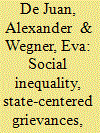

|
|
|
|
|
| Summary/Abstract |
What role does horizontal social inequality play for political protest in middle-income countries? We argue that public social service provision is an important driver of state perceptions. When a state fails to deliver services in an equitable manner, trust in institutions erodes and protest becomes more likely. We use a mixed methods design to investigate this argument in South Africa. First, we combine police event records with census data to estimate correlations between service inequality and protests. Second, we draw on an opinion survey with 27,000 respondents to investigate the suggested mechanism linking social inequality to protest through political attitudes. Third, we focus on qualitative protest accounts in two areas identified by a matching approach to assess the plausibility of our quantitative findings. Throughout these analyses, we document a robust association between horizontal social inequality and protest.
|
|
|
|
|
|
|
|
|
|
|
|
|
|
|
|
| 8 |
ID:
163436
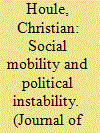

|
|
|
|
|
| Summary/Abstract |
Does social mobility foster political stability? While there is a vibrant literature on the effect of economic inequality on political unrest, the recent literature has remained silent about the effect of social mobility on instability. Yet, inequality and social mobility, although related, are fundamentally distinct, and immobility is likely to be perceived as even more unfair than inequality, meaning that it may generate at least as much grievances. In this article, I argue that social immobility fuels political instability. To test this hypothesis, I develop an indicator of social mobility covering more than 100 countries worldwide. I then conduct the first large-N cross-national test of the effect of social mobility on political instability to date. Consistent with my argument, I find that countries with low social mobility levels are more likely to experience riots, general strikes, antigovernment demonstrations, political assassinations, guerillas, revolutions, and civil wars.
|
|
|
|
|
|
|
|
|
|
|
|
|
|
|
|
| 9 |
ID:
163438
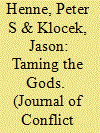

|
|
|
|
|
| Summary/Abstract |
Despite a robust literature on general forms of state repression, the determinants of religious repression remain unclear. This article argues that a regime’s experience with religious conflict will lead it to be more repressive of religious groups within its territory for three primary reasons. Religious conflict increases the behavioral threat posed by religious groups, lowers the cost of repressing these communities, and evokes vivid memories of past religious violence that underscore the role of the state in taming religion to maintain social order. New, cross-national data on religious conflict and repression from 1990 to 2009 show that religious conflict has a significant and positive effect on the level of religious repression for the time period under investigation, expanding the types and severity of government restrictions on religion in a country. Our findings point to the importance of studying the causes and nature of negative sanctions against religious communities, specifically.
|
|
|
|
|
|
|
|
|
|
|
|
|
|
|
|
| 10 |
ID:
163452
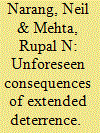

|
|
|
|
|
| Summary/Abstract |
Do “nuclear umbrellas” create a moral hazard that can increase the risk of war? In this article, we investigate whether situations of extended deterrence in which a nuclear patron makes a defensive commitment to a nonnuclear client state can inadvertently increase the likelihood that a client will initiate a crisis with another state. Using data on the crisis behavior of states from 1950 to 2000, we estimate the impact of a nuclear umbrella on various crisis outcomes, including the initiation and escalation of militarized conflict. Interestingly, we find no evidence that such commitments increase the risk of war or even two-sided violence at lower levels. However, consistent with both the moral hazard logic and bargaining theories of war, we show that this appears to be because potential target states offer increased policy concessions to client states to avoid costly fighting. Thus, the link between nuclear umbrellas and moral hazard appears to be real, but it is reflected in the division of benefits rather than a greater likelihood of war. The results have important policy implications as the US contemplates extending its nuclear umbrella.
|
|
|
|
|
|
|
|
|
|
|
|
|
|
|
|
|
|
|
|
|